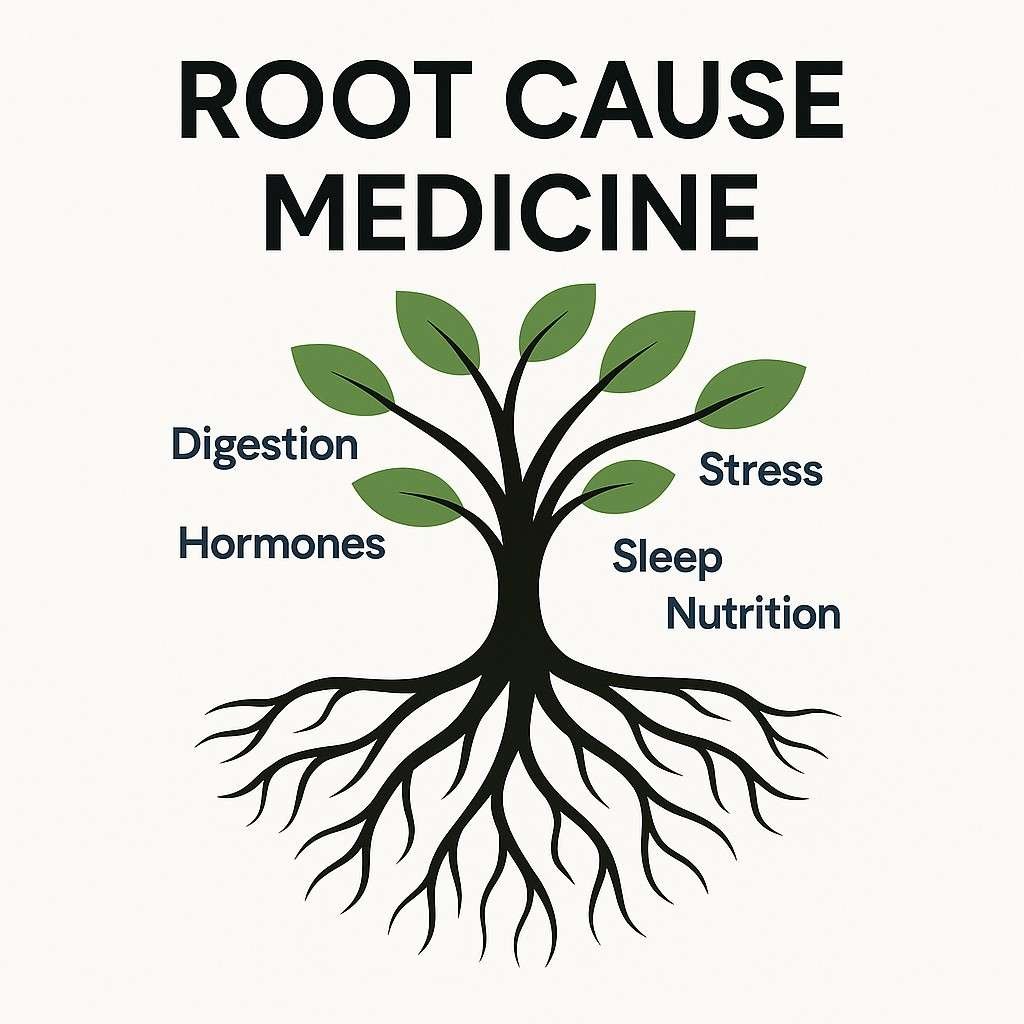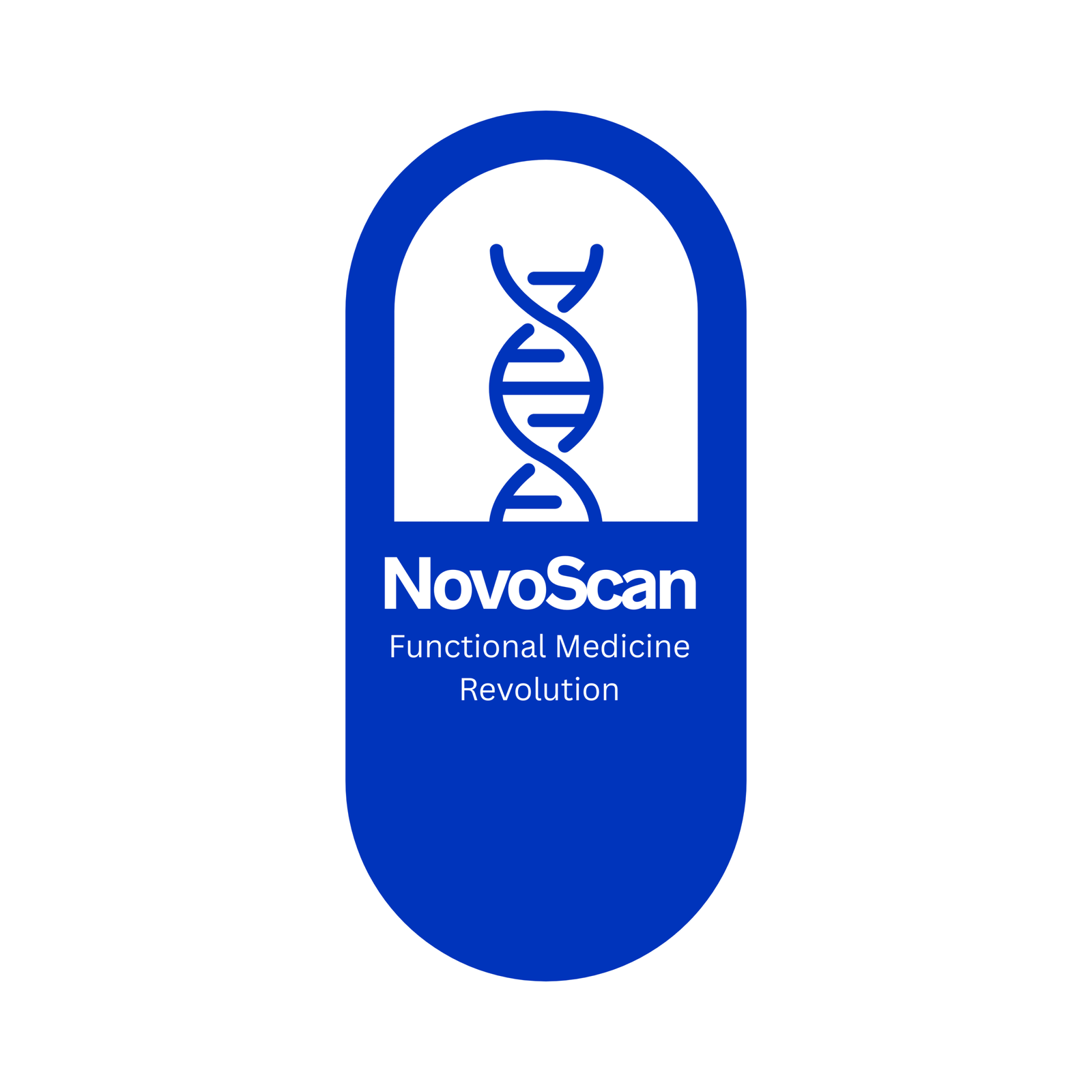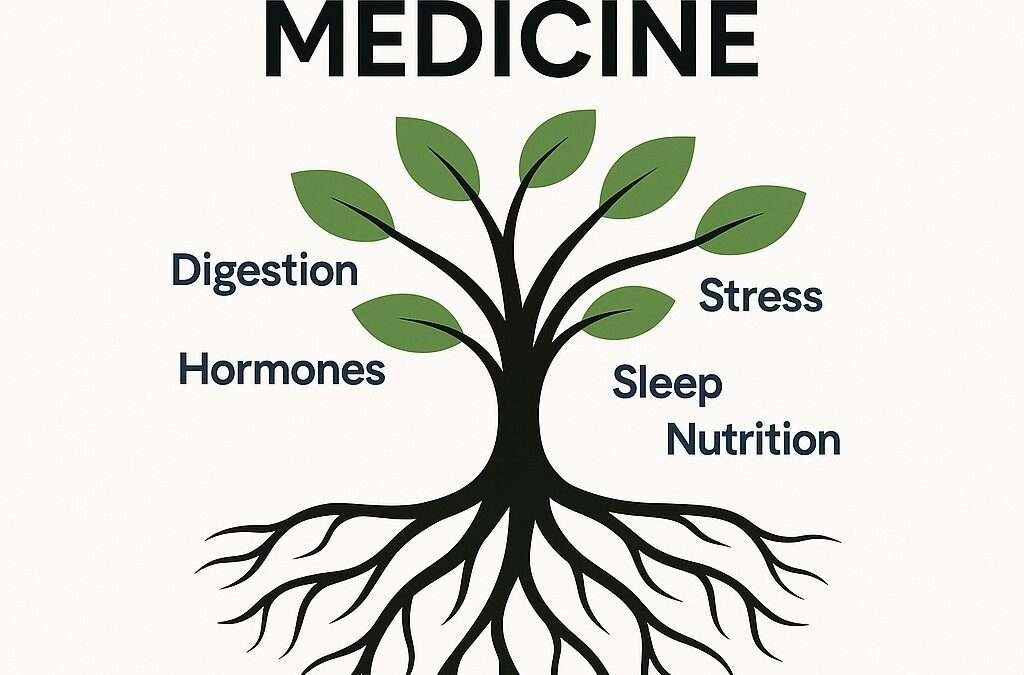
Many of us know the cycle: another pill for blood pressure, a tablet for heartburn, or medicine for sleep, only to find the relief never lasts. It feels like a cycle of short-term fixes that never truly solve the problem. What most of us truly want is not another temporary fix but lasting health. That is what root cause medicine and functional medicine together are designed to do.
Rather than silencing symptoms, it looks deeper to understand why issues like fatigue, stress, or high blood pressure appear and how they can be corrected at the source. In this blog, you will learn what root cause medicine means, how it is different from conventional care, and why it matters so much in India today.
Shivani Bajwa, a member of the Indian Association of Functional Medicine, has pioneered functional medicine in India through Novoscan, which makes long-term wellness simple, compassionate, and practical through holistic health solutions.
What Is Root Cause Medicine?
Imagine a tree with browning leaves. Spraying them green may look better for a few days, but unless you water the roots, the tree will stay sick. Root cause medicine nourishes the roots of health—your digestion, hormones, stress, sleep, and nutrition—rather than simply colouring the leaves.
Most conventional doctor visits focus on symptoms: a pill for blood pressure, a tablet for reflux, or a sedative for insomnia. While life-saving in emergencies, this model often overlooks why the body is sending distress signals in the first place. According to Health Affairs, nearly 75 percent of all healthcare spending in the United States is devoted to managing chronic diseases. Most of this care focuses on controlling symptoms rather than addressing why these conditions develop. This is exactly the gap that root cause medicine aims to close by looking deeper at nutrition, sleep, stress, and lifestyle factors.
In India, where patients often spend less than 5 minutes with a doctor on average, there is rarely time to ask deeper questions about diet, stress, or lifestyle, which are the very roots of chronic illness. Root cause medicine fills this gap by asking not “What pill matches this symptom?” but “Why did this symptom appear?”
Now that we have a basic understanding of what root cause medicine is, let us look at why this discussion is important, especially in India.
Why It Matters, Especially in India
India is facing a silent shift. Just decades ago, infections and malnutrition dominated health concerns. Today, non-communicable diseases (NCDs) like diabetes, heart disease, and cancer account for 71% of all deaths in the country. India also has the second-highest number of adults with diabetes in the world, with cases projected to cross 130 million by 2045. Out-of-pocket healthcare spending here is nearly 50% of total health expenditure, making prevention through root cause care even more critical. This makes preventive healthcare strategies in India essential.
Globally, NCDs caused at least 43.8 million deaths in 2021, or nearly three out of every four deaths not linked to pandemics. In India, that burden is magnified by rapid urbanisation, air pollution, sedentary jobs, and diets high in refined food. This is where lifestyle medicine in India is urgently needed.
Unless the underlying issues, like nutrition, sleep, stress, and toxins, are addressed, people remain stuck in cycles of medication and fatigue. Root cause medicine offers a chance to break the cycle.
Now that we know why it matters, let’s see what this approach actually looks like in everyday life.
How Root Cause Medicine Works in Practice
Think of your body as a symphony orchestra. If the violin plays out of tune, the whole performance feels off. Similarly, if your gut, hormones, or sleep rhythm falters, the entire system suffers. Root cause medicine is the conductor, tuning each instrument until harmony returns.
At Novoscan, our work often begins with the Novoscan Health Kit, which checks hidden imbalances in nutrition, metabolism, and stress. From there, support is personalised, covering:
- Gut Health: repairing digestion, microbiome, and nutrient absorption.
- Sleep Quality: ensuring genuine rest and nightly repair.
- Hormone Balance: managing thyroid, cortisol, and insulin.
- Stress Resilience: training the nervous system to reset.
- Nutrition: identifying deficits that medication never touches.
- Lifestyle Rhythm: building movement, rest, and balance.
Take someone with high blood pressure. Conventional care may increase medication. Root cause care looks deeper: is it driven by poor sleep, chronic stress, excess salt, or nutrient depletion? By correcting those, blood pressure often falls naturally. For example, a 52-year-old businessman in Ludhiana lowered his blood pressure without increasing medication by fixing sleep apnea and reducing chronic stress. This forms the heart of lifestyle medicine in India, blending prevention with sustainable care.
This sounds compelling, but does the science back it? Let’s look at the evidence.
The Science Behind Root Cause Medicine
Science increasingly validates what patients feel: fixing roots creates stronger health than masking leaves.
Evidence Highlights:
- A Cleveland Clinic study showed that 31% of functional medicine patients improved their physical health scores by 5 or more points at 6 months, compared to 22% in conventional primary care.
- Another Cleveland Clinic study found that Shared Medical Appointments (SMAs) delivered greater improvements in quality of life, more weight loss, and lower costs than individual visits. These results echo the outcomes we see in functional medicine India programs at Novoscan.
- A PubMed analysis (2025) showed that global diabetes-related disability burden has grown dramatically since 1990, underscoring the failure of symptom-only management and the need for lifestyle-based root cause care.
- WHO estimates that 82% of premature NCD deaths occur in low- and middle-income countries like India, making prevention and root cause solutions essential. For India, this is urgent: nearly 77 million people live with diabetes, and hypertension is estimated to affect over 220 million adults, according to the WHO.
Together, these findings show that root cause medicine is not an alternative—it is evidence-based, measurable, and sustainable.
Now let’s step out of the numbers and into personal reality.
How Root Cause Medicine Changes Lives
A 35-year-old professional came to us despite taking thyroid medication for years. Her energy kept dropping, and stress was overwhelming. By correcting nutrient gaps, improving sleep quality, and reducing stress patterns—not just adjusting medicine—her energy and focus returned.
Root cause medicine listens. It sees you as more than a chart of symptoms, and it offers a plan that restores balance instead of covering imbalance. At Novoscan, led by Shivani Bajwa, this is not theory but practice: blending science with empathy for people who want to live fully again.
With this clarity, we can conclude how root cause medicine redefines health.
Conclusion: Healing from the Ground Up
Health does not have to mean managing decline. It can mean regaining energy, joy, and control. Root cause medicine is about breaking the cycle of temporary fixes and addressing the underlying issues.
At Novoscan, Shivani Bajwa and her team combine scientific precision with compassionate care. The result is care that restores, not just manages.
Root cause medicine is the future of healthcare in India, not just another wellness trend. Take the first step toward lifestyle medicine in India with the Novoscan Health Kit. Your body already knows what it needs. We help you listen.
Frequently Asked Questions
1. Can children and teenagers benefit from root cause medicine?
Yes. Children and teenagers can benefit from root cause medicine because it targets the underlying causes of health issues like obesity, hormonal imbalance, and early diabetes. Addressing these early through nutrition, lifestyle, and stress care helps prevent long-term disease and supports healthy growth.
2. How is root cause medicine different from integrative medicine?
Root cause medicine focuses on identifying and fixing the root drivers of disease, such as poor sleep, nutrition gaps, or stress. Integrative medicine, on the other hand, combines conventional treatment with complementary approaches like yoga, meditation, or acupuncture.
3. Is root cause medicine more expensive than conventional care?
Not usually. While initial tests in root cause medicine may cost more, studies show it lowers long-term costs by reducing medication use, preventing hospitalisations, and improving overall quality of life. It is a smart investment in preventive healthcare.
4. Can root cause medicine reverse chronic diseases?
Root cause medicine can often reverse early-stage conditions like hypertension, fatty liver, or pre-diabetes. In advanced cases, it may not fully reverse disease, but it slows progression, improves quality of life, and reduces dependence on medications.
5. How do I prepare for a Novoscan Health Kit?
To prepare for the Novoscan Health Kit, you’ll collect simple at-home samples and fill out a lifestyle questionnaire. These results guide a personalised plan that identifies your body’s true needs and creates a clear, root cause-based health roadmap.
6. What is root cause medicine in India?
Root cause medicine in India is a healthcare approach that focuses on identifying and treating the underlying causes of chronic illness, such as poor nutrition, stress, sleep imbalance, and toxins. At Novoscan, this method combines science with lifestyle medicine to deliver long-term, sustainable health results.
7. Is root cause medicine evidence-based?
Yes. Root cause medicine is evidence-based and supported by studies from institutions like the Cleveland Clinic, which show better outcomes compared to conventional care. Research highlights improvements in quality of life, reduced medication use, and long-term disease prevention.

